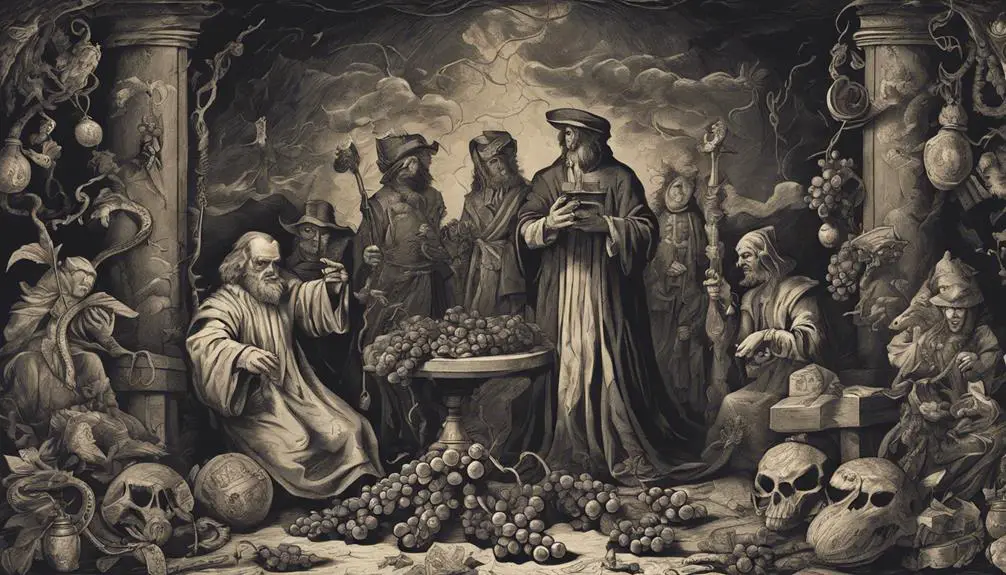Plunge into the dark tales of the Bible's most infamous sinners and question what their stories reveal about morality and redemption.

Worst Sinners in the Bible
Drawing a parallel from Dante's Inferno, where the worst sinners are given the deepest circles of Hell, let's explore some of the Bible's most notorious sinners.
You'll find compelling stories of transgressions and punishments, from Judas Iscariot's betrayal to King David's deadly lust, Cain's infamous murder, Jezebel's manipulations, and the Pharaoh's hardened heart.
But as we venture into these tales, you might find yourself questioning: who truly was the greatest sinner and what does their story tell us about morality, redemption, and human nature?
Key Takeaways
- Judas Iscariot and King David epitomize the devastating effects of betrayal, sin, and guilt.
- Cain's actions underscore the dangers of unchecked negative emotions like jealousy and anger.
- Jezebel's story illuminates the dire consequences of abusing power and defying divine authority.
- Pharaoh's obstinacy and King David's deceitful actions highlight the tragic outcomes of pride, stubbornness, and uncontrolled desire.
Judas Iscariot's Betrayal

Diving into the depths of Judas Iscariot's betrayal, you'll find a tale of deceit and remorse that's deeply woven into the fabric of the Bible's narrative. His act of treachery, handing over Jesus to the Roman authorities, has been depicted as the ultimate act of perfidy. Yet the story doesn't end with betrayal; it continues with Judas's remorse.
Analyzing the biblical text, you'll discover that Judas didn't escape the betrayal consequences. His guilt led him to return the thirty pieces of silver, the price of his treachery, to the religious leaders. His remorse was so intense that he took his own life, unable to bear the weight of his actions.
While his act of betrayal was damning, Judas's remorse is a significant part of the narrative. It illustrates the heavy toll that guilt can have on the human spirit, an implication that the act of betrayal wasn't taken lightly by Judas. This narrative serves as a stark reminder of the consequences of betrayal, a lesson that has echoed through centuries.
The story of Judas is a potent blend of ambition, deceit, remorse, and retribution, encapsulating the devastating impact of betrayal.
King David's Deadly Lust

Shifting our focus from the treacherous actions of Judas Iscariot, let's now explore another biblical figure whose sin had deadly consequences: King David, a man known for his lustful mistake that led to an unexpected death. David, although a man after God's own heart, committed adultery with Bathsheba, the wife of Uriah, one of his most loyal soldiers. This act of lust wasn't his only sin; he then orchestrated Uriah's fate, ensuring his death on the battlefield to cover his tracks.
Despite his actions, David's remorse was deeply felt. He penned Psalm 51, a moving expression of repentance. However, his actions had already set in motion a series of tragic events, reflecting the serious consequences of his sins.
Here's a table highlighting the contrasts in David's life:
David's Life |
Emotional Impact |
|---|---|
Man After God's Heart |
Inspires Faith |
Adultery with Bathsheba |
Evokes Disappointment |
Uriah's Planned Death |
Provokes Anger |
David's Remorse |
Elicits Sympathy |
Consequences of His Actions |
Promotes Reflection |
As you reflect on David's story, remember that no one, not even a revered king, is exempt from the consequences of their actions. Let this be a sobering reminder of the cost of sin.
Cain: The First Murderer

Turning our attention to Cain, it's essential to note that he committed the first recorded murder in biblical history, striking down his own brother out of jealousy and anger. This act of violence wasn't a spur-of-the-moment decision, but rather a calculated response fueled by Cain's motivation, a deep-seated resentment towards his brother Abel.
The brotherly conflict began when God accepted Abel's offering over Cain's. This rejection sparked Cain's anger, leading him to commit a heinous act against his own flesh and blood. You see, the Bible portrays Cain not only as a murderer but as someone who let his negative emotions control him, ultimately leading him down a path of destruction.
Analyzing Cain's actions, it's clear that his sin wasn't just the murder itself, but also the jealousy, anger, and lack of self-control that led to it. His story serves as a stark reminder of the consequences of letting envy and anger dictate one's actions. It's a cautionary tale about the importance of managing our emotions and treating others, especially those closest to us, with love and respect.
Jezebel's Malicious Manipulations

In the annals of biblical villains, Jezebel's cunning and manipulative actions stand starkly, demonstrating the depths of malevolence one can sink to when driven by selfish desires and unbridled ambition. Her story is an illustration of power abuse at its worst. As queen, she wielded her authority ruthlessly, often resorting to deceit and coercion to achieve her goals.
Jezebel's unfaithful actions are equally infamous. She brazenly defied God's commandments, leading the Israelites into idolatry and causing a spiritual crisis in the kingdom. Despite numerous warnings, she persisted in her wicked ways, showing no remorse or penitence.
To create a vivid image of her malicious manipulations, let's look at this table:
Jezebel's Actions |
Implications |
Biblical Reference |
|---|---|---|
Promoted Baal worship |
Led Israel into idolatry |
1 Kings 16:31-33 |
Orchestrated Naboth's murder |
Abused power for personal gain |
1 Kings 21:1-16 |
Threatened Prophet Elijah |
Displayed blatant defiance |
1 Kings 19:1-2 |
Corrupted King Ahab |
Influenced others negatively |
1 Kings 21:25 |
Met a gruesome end |
Received divine justice |
2 Kings 9:30-37 |
Jezebel's story serves as a stark reminder of the dire consequences of power abuse and unfaithfulness.
Pharaoh's Hardened Heart

Let's now delve into the story of the Pharaoh, whose heart hardened to the point of bringing disaster upon his own people. You'll find this biblical account in the book of Exodus, where Pharaoh's stubbornness is laid bare. Despite witnessing a series of divine interventions, his heart only stiffened further, causing immense suffering for the people of Egypt.
The concept of heart hardening isn't a mere literary device. It's a metaphor for obstinacy, resistance to change, and refusal to heed warnings or advice. The Pharaoh's heart hardened not out of physical ailment but out of spiritual stubbornness and pride. Even when faced with ten plagues, from water turning into blood to the death of his own firstborn, he remained unyielding.
You may wonder, why did God allow this? It's a complex question with no easy answers. Some theologians argue that God, in His divine intervention, hardened Pharaoh's heart to demonstrate His power and sovereignty. Others believe that Pharaoh's free will allowed his heart to harden.
Regardless, the story of Pharaoh's hardened heart serves as a stark reminder of the consequences of pride, stubbornness, and ignoring divine interventions. It's a lesson that's as relevant today as it was thousands of years ago.
Frequently Asked Questions
How Does the Bible Define 'Sin' and Why Are These Characters Considered the 'Worst Sinners'?
You're exploring how the Bible views 'sin', and why certain individuals bear the label 'worst sinners'. 'Sin' is defined as any act contrary to God's will. It's driven by sinful motivations, which include greed, lust, and pride.
Those branded 'worst sinners' have committed severe transgressions, yet the Bible also delves into the concept of forgiveness, teaching us to understand and seek it regardless of the sin's gravity.
Are There Any Female Characters in the Bible Who Are Considered as 'Worst Sinners' Apart From Jezebel?
Yes, apart from Jezebel, there are other female characters in the Bible who're viewed as 'worst sinners'. Notable among these are the 'Female Villains in Scripture' like Herodias and Athaliah, the 'Sinful Queens of the Bible'.
Herodias masterminded the beheading of John the Baptist while Athaliah eradicated the royal family. These women committed heinous acts, highlighting the gravity of their sins.
How Does the Bible Typically Depict the Redemption or Punishment of These 'Worst Sinners'?
You'll find that the Bible usually depicts 'worst sinners' facing divine judgement depictions, often harsh and immediate.
However, there's also the aspect of sinners' redemption pathways. These are instances where despite their grave sins, individuals find forgiveness through repentance and turning back to God.
It's a complex interplay of divine justice and mercy, showcasing both the consequences of sin and the grace of redemption.
Are There Any Instances in the Bible Where These 'Worst Sinners' Showed Remorse or Attempted to Atone for Their Sins?
Yes, you'll find instances of sinner's transformation in the Bible. A classic example is Saul of Tarsus, who was notorious for persecuting Christians. Overwhelmed by a divine encounter, Saul felt deep remorse, changed his ways, and became Paul, an apostle of Christ.
This shows that the Bible depicts regretful actions leading to transformative redemption, underscoring the theme of divine mercy and forgiveness for those genuinely seeking to atone.
What Lessons Can Modern Readers Learn From the Stories of These 'Worst Sinners' in the Bible?
Through modern morality reflections, you can learn crucial life lessons from these stories. They teach you about the consequences of poor choices and the power of redemption. Even the worst sinners have the capacity for remorse and change.
Their journeys offer you insight into the complexities of human nature, encouraging empathy and understanding. Thus, these stories can serve as guides for your own actions, promoting personal growth and ethical behavior.
Conclusion
You've journeyed through some of the Bible's darkest tales, encountering Judas' betrayal, King David's deadly lust, Cain's murderous act, Jezebel's manipulations, and the Pharaoh's hardened heart. These figures stand as stark reminders of the depths humanity can sink to when it strays from virtue.
But remember, even in these narratives, there's a glimmer of redemption, a call to introspection and change. So, while their sins are grave, don't forget the lessons they offer.



Sign up